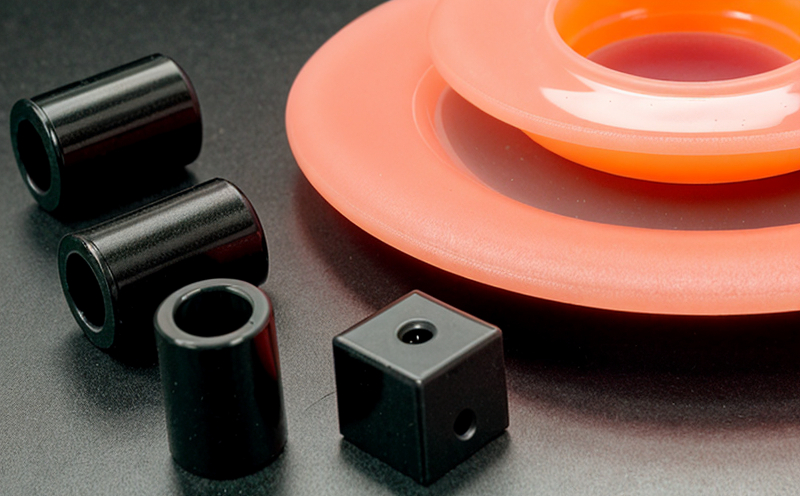Sports & Leisure Plastics Testing
Testing sports and leisure plastics is a specialized field that ensures the integrity, durability, and performance of materials used in various products. This testing caters to industries like footwear, apparel, sporting goods, and playground equipment. Compliance with international standards such as ISO 9073 for colorfastness, ASTM D648 for impact resistance, and EN 13258 for flame retardancy is critical.
The sector of sports and leisure plastics encompasses a wide range of products that are exposed to diverse environmental conditions. From the high-impact environments of football or hockey, where materials must withstand repeated stress, to the more dynamic and flexible requirements of running shoes or cycling gear, these plastics need to meet stringent safety and performance criteria.
Innovations in sports and leisure plastics often push the boundaries of material science. For instance, manufacturers are continuously developing lighter yet stronger plastics for athletic equipment. This requires rigorous testing to ensure that these materials can withstand the rigors of use without compromising safety or performance.
Testing begins with a thorough understanding of the product's intended use and the environmental conditions it will encounter. This includes factors such as temperature, humidity, abrasion resistance, UV exposure, and mechanical stress. The choice of test methods is critical and varies based on the specific properties being evaluated.
- ISO 9073-2: Colorfastness to rubbing
- ASTM D648: Standard test method for tensile strength of plastics
- EN 13258: Specification for flame retardant materials used in sports equipment
The testing process involves a series of steps, starting with sample preparation. This includes cutting samples to the correct dimensions and ensuring they are free from defects that could affect test results. Once prepared, the samples undergo various tests:
- Impact Resistance Testing: Determines how well materials can withstand sudden impacts without breaking.
- Bend Strength Testing: Measures the amount of bending a material can endure before fracturing.
- Thermal Shock Testing: Assesses how materials perform under rapid temperature changes.
The results from these tests are critical in ensuring that products meet regulatory and safety standards. Compliance with international standards is essential, not only for market access but also to maintain consumer trust. For instance, the European Union's Restriction of Hazardous Substances Directive (RoHS) requires manufacturers to ensure their products contain no more than specific levels of certain hazardous substances.
Understanding the implications of test failures is equally important. A failed impact resistance test could indicate that a product might not perform adequately in real-world conditions, potentially leading to injuries or reduced performance. Therefore, comprehensive testing ensures that products are safe and reliable for their intended use.
Customer Impact and Satisfaction
Testing sports and leisure plastics has a direct impact on customer satisfaction by ensuring product quality and safety. Quality managers rely heavily on test results to make informed decisions about the materials used in their products. Compliance officers ensure that all processes adhere to regulatory requirements, thereby avoiding costly recalls or legal issues.
R&D engineers benefit from detailed testing data as it helps them refine material formulations and improve product performance. By identifying weaknesses early in the development process, they can make necessary adjustments before large-scale production begins. This not only enhances product quality but also reduces development costs and time to market.
For procurement teams, understanding test results is crucial for selecting suppliers who meet stringent quality standards. Ensuring that all components are up to specification helps maintain the integrity of the final product. This collaborative approach between different departments within a company ensures a cohesive focus on delivering high-quality products to customers.
International Acceptance and Recognition
- ISO: International Organization for Standardization standards are widely recognized across borders, ensuring consistency in testing methodologies.
- ASTM: American Society for Testing and Materials offers a comprehensive set of voluntary technical standards that are accepted globally.
- EN: European Norms provide harmonized specifications that are used throughout Europe, facilitating easier trade within the EU.
Recognition from these bodies ensures that testing results are credible and can be trusted by stakeholders worldwide. Compliance with these standards not only enhances a company's reputation but also opens doors to international markets. For instance, many countries require imported products to meet local standards, making compliance essential for export.
Use Cases and Application Examples
The testing of sports and leisure plastics is crucial in ensuring the safety and performance of various products. For instance, running shoes must be durable yet lightweight to provide maximum comfort and support during long runs. Impact resistance tests are essential to ensure that the midsoles can withstand the repetitive impact of footsteps without breaking down.
Football boots also require rigorous testing to ensure they can handle the high-impact forces encountered on a football pitch. Bend strength testing is critical in this context as it ensures that the leather and synthetic materials used in the boots remain flexible but strong enough to provide support during quick changes of direction.
Cycling helmets, another important application, must meet strict safety standards. Impact resistance tests are vital here to ensure that the helmet can absorb shock effectively, protecting the rider's head in case of a fall. Additionally, thermal shock testing is used to assess how well materials perform under extreme temperature changes, which is crucial for products like helmets and protective gear.
Playground equipment, especially for young children, undergoes extensive testing to ensure it is safe and durable enough for daily use. This includes abrasion resistance tests to prevent surfaces from wearing down too quickly, which could pose a risk to users.





